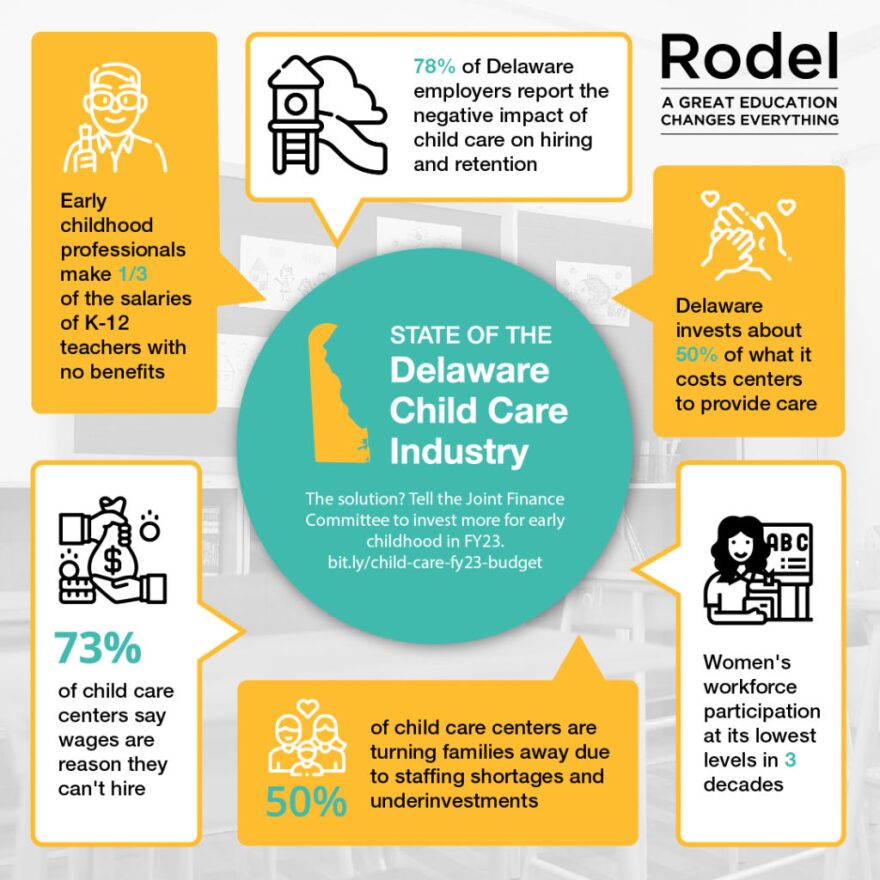Results of a 2022 early childhood education survey, a statewide, scientific poll, offer a glimpse into how Delaware residents view state spending on child care.
One of the key findings of the survey showed a broad majority of Delawareans say finding quality, affordable child care or education is a serious problem in their community.
The results of the survey were discussed as part of Early Childhood Advocacy Day Thursday, hosted by the Delaware Association for the Education of Young Children.
Legislators were also invited to speak on the current state of early childhood education and childcare in the state, allowing educators and parents affected by related legislation to gain a better understanding of how it’s currently being worked on.
State Senator Kyle Evans Gay (D-Talleyville) was part of that discussion
“Early child care spending isn’t just spending, it’s investment. And it is a proven high return on investment,” said Gay. “So we need to be ready to make that pitch to Delawareans. That this is a place where they want to invest, where they want us to take that action.”
Gay’s call for increased support for Delawareans was reflected in some of the survey results, with nearly 3-in-4 voters supporting increased funding to ensure children under the age of 5 have access to affordable, high-quality child care or education.
And voters ranked child care and early childhood education as a high priority, above other areas such as investment in public libraries and transportation.
But it still lags behind K-12 public education. The survey showed voters rank K-12 public education as one of their top priorities in state spending, with 80% viewing it as very important. But only 59% viewed early childhood education and childcare for kids under 5 as very important.
Jamie Schneider, President of the Association for the Education of Young Children, says that this gap is important to recognize.
“The long term goal is making early care and education a public good in the way that we see K-12 education. Right now if you have a child in K-12 education, the funding streams that support your child going to school are varied,” said Scheider. “There are multiple funding streams that support our K-12 system. And currently, in early care and education, the only funding streams that support our families is if you meet an economic need.”
The survey results also coincide with the findings of a related report by the Federal Reserve Bank of Philadelphia, in partnership with the Delaware State Chamber of Commerce, Rodel, and the Delaware Department of Education.

That looked at the lack of affordable childcare as a factor in decreased workforce participation.
While the 2022 childhood education survey made it clear that a majority of Delawareans are looking for an increase in quality, affordable child care or education, supply is not meeting demand. Half of child care centers in Delaware are turning families away because of staffing shortages and under investment, with Delaware only investing about 50% of what it costs centers to provide care.
Additionally, 78% of Delaware employers are reporting the negative impact of this lack of childcare on job hiring and retention, with women’s workforce participation being at its lowest level in decades.
State Sen. Laura Sturgeon (D-Hockessin) noted this issue during the discussion.
“Right now there are other states that are offering much more in the way of early childcare, Pre-K, and those states are frankly more attractive to businesses and workers, and I want to see Delaware compete,” said Sturgeon.
Both reports show a need for increased funding in early childhood education and childcare for kids under 5, and both the DEAEYC and Rodel stress that Delawareans hoping to make change should reach out to lawmakers to do so.
“This is truly when voices matter. Emails matter, phone calls matter. We have definitely targeted our information to those who are making budget priority decisions in the joint finance committee. And we know we have garnered much broader support from the joint finance committee that we have in any year prior,” explained Scheider. “And now it’s working on those folks who either are on the fence, need more information, or need to understand why their constituents believe that this is an area to prioritize funding for the state.”



